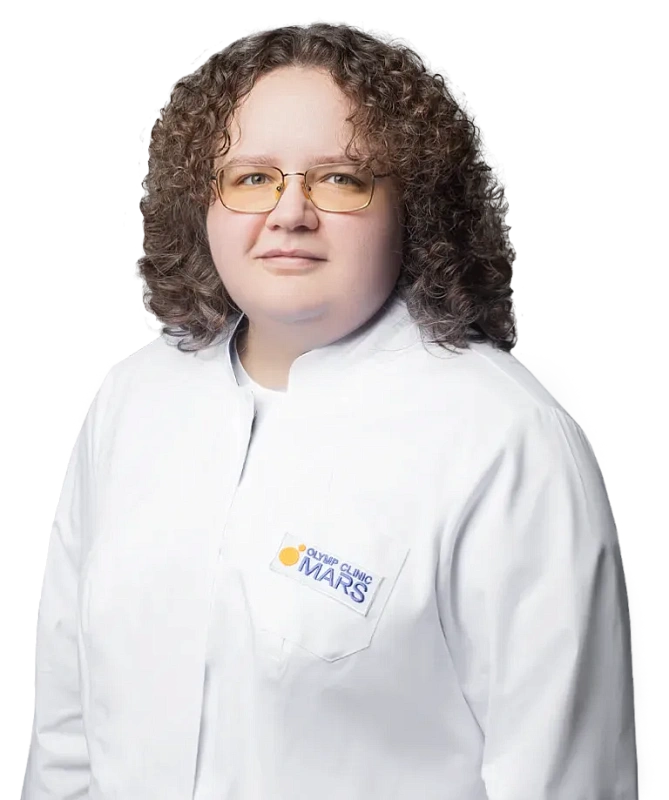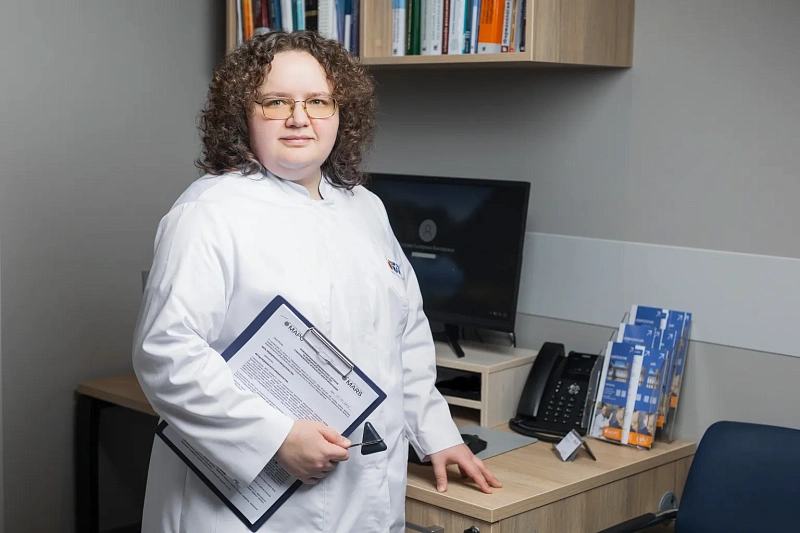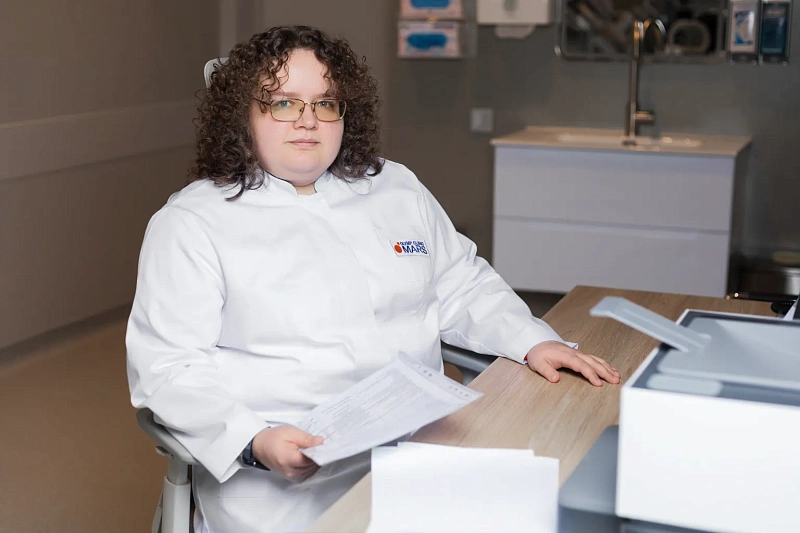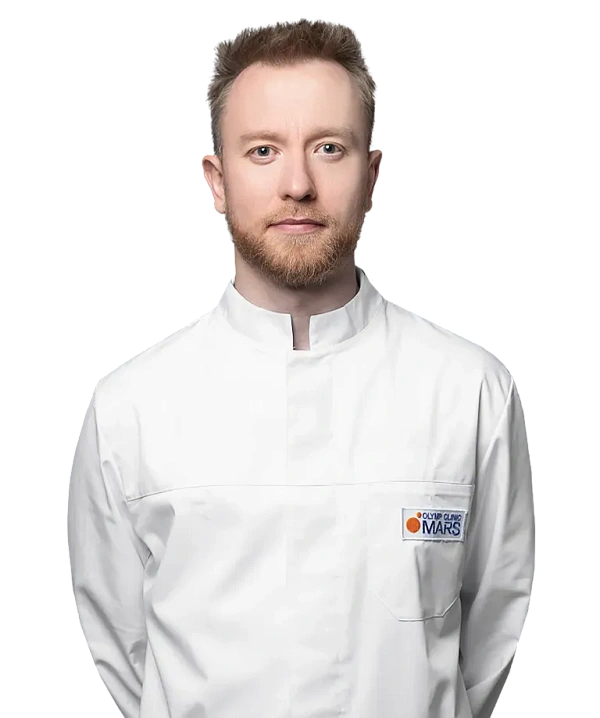Kozlova Ekaterina Viktorovna
Neurologist, functional diagnostics doctor (stimulation and needle EMG)
Languages
English
Ekaterina Viktorovna is a highly qualified specialist with experience in both planned and emergency neurology.
Ekaterina Viktorovna is actively involved in scientific activities.

The patient and the doctor are allies. Only by working in tandem can one achieve success in diagnosing and treating the disease.

Education and qualifications
Faculty of Medicine, specialty "General Medicine"
Federal State Budgetary Educational Institution of Higher Education Saratov State Medical University named after V.I. Razumovsky of the Ministry of Health of the Russian Federation.
Clinical residency in the specialty "Neurology"
Federal State Autonomous Educational Institution of Higher Education Russian National Research Medical University named after N.I. Pirogov of the Ministry of Health of the Russian Federation (Pirogov University)
Advanced training in the program "Current issues of neurology"
Federal State Budgetary Educational Institution of Higher Education “Russian University of Medicine” of the Ministry of Health of the Russian Federation (Moscow)
Professional retraining under the program "Functional diagnostics"
CHOU DPO "ECO-EDUCATION" (Izhevsk)
Advanced training in the program "Current issues of neurology"
LLC "Interregional Center for Continuous Medical and Pharmaceutical Education" (Moscow)
Advanced training in the program "Functional diagnostics of the state of the central and peripheral nervous system (clinical neurophysiology)"
LLC "Interregional Center for Continuous Medical and Pharmaceutical Education" (Moscow)
Frequently Asked Questions
Everyone has a headache. How do I know when it's time to see a doctor?
- The headache occurred for the first time in my life, especially at the age of 6 and over 50 years.
- The headache occurred during pregnancy or in the postpartum period.
- The headache occurred after the injury.
- The headache occurred after an infectious disease, vaccination.
- The headache occurred in the presence of cancer, immunodeficiency, including HIV infection.
- The headache is thunderous ("like a thunderbolt or lightning") – the intensity of the pain reaches its peak at the very beginning of the attack in a few seconds or minutes.
- Headache occurs when changing body position, tilting the head, straining, sneezing, coughing, physical exertion, sexual activity.
- Headache occurs during sleep or upon awakening.
- Headache is accompanied by neurological disorders (depression of consciousness, increased drowsiness, impaired vision / speech, weakness / numbness in the extremities, facial asymmetry, impaired coordination / balance, uncontrollable vomiting, etc.).
- Headache is accompanied by an increase in body temperature and / or the appearance of a rash on the body.
- Headache is accompanied by pain in the eye area, redness of the eye, drooping eyelid, lacrimation, nasal discharge or nasal congestion, local sweating and/or discoloration of the face.
- The headache has changed its characteristics (the localization and/or intensity of pain have changed, the duration and/or frequency of seizures have increased).
- The usual analgesics have stopped helping and you need to take them more and more often.
Doctor: Kozlova Ekaterina Viktorovna
Should you consult a neurologist or a traumatologist for back pain?
You should consult a neurologist if:
• Pain radiates to the arm or leg.
• There is numbness, tingling, burning sensation, or electric shock.
• There is weakness in the arm or leg.
• There is a violation of the function of the bladder or intestines.
• You have previously had herniated discs and had spinal surgery.
You should consult a traumatologist if:
• The pain is localized in the joint area or spreads to this area.
• Pain occurs and/or increases with certain movements in the joint.
• The occurrence of pain is associated with an accident, fall or sports injury, when there is a suspicion of fractures, dislocations or damage to the ligamentous apparatus.
• The pain is chronic and is associated with spinal deformity (scoliosis, kyphosis).
In some cases, you may need to consult both specialists, since back pain may include both neurological and structural components associated with the pathology of the musculoskeletal system.
In addition, back pain may be associated with problems in other organs and systems, which requires consultation with related specialists (for example, a rheumatologist, gynecologist, urologist or cardiologist).
It is worth emphasizing that if the back pain is severe, sudden, or accompanied by symptoms such as fever, unexplained weight loss, or loss of bladder/bowel control, then medical attention should be sought immediately.
Doctor: Kozlova Ekaterina Viktorovna
Are decreased concentration and memory impairment signs of impending dementia?
The "red flags" of dementia:
- Memory loss that disrupts daily life (for example, forgetting recently received information, important dates or events).
- Difficulties with planning or solving problems.
- Problems with completing familiar tasks.
- Confusion about time or place.
- Problems with understanding visual images or spatial relationships.
- New problems with words in oral or written speech.
- Loss of the ability to reconstruct previous events.
- Deterioration of the ability to reason.
- Refusal from work or social activities.
- Changes in mood, habits, and behavior.
If you or someone close to you are experiencing similar cognitive changes, it is important to consult a doctor. A doctor can perform cognitive tests, blood tests, and imaging studies to assess brain health. An early assessment can help identify the cause of cognitive changes, determine whether it is related to dementia or another disease, and develop treatment tactics.
Doctor: Kozlova Ekaterina Viktorovna
How to protect yourself from stroke?
Among the basic principles are:
- Rational nutrition and adherence to the prescribed diet. If you have hypertension, you should lim it your intake of table salt. In the presence of hypercholesterolemia and atherosclerosis, it is shown to reduce the consumption of animal fats and trans fats to 30% of those consumed, by limiting the consumption of fried foods, semi-finished meat products (sausages, sausages, cutlets, liver pates, etc.), meat offal (liver, kidneys), fatty meats, any fish caviar. The diet can be expanded with seafood, fatty varieties of marine fish, seeds and nuts. It is important to consume vegetables and herbs in an amount of at least 400-500 g / day (both raw and processed, not counting potatoes). When choosing side dishes, it is better to give preference to whole wheat and oats, brown rice, quinoa, pasta made from durum wheat or whole grain flour.
- Daily consumption of plain water, not just ready-made drinks, tea, coffee, etc. Proper hydration supports overall health and helps maintain blood pressure.
- Regular sports activities. Both moderate-intensity aerobic exercise (at least 150 minutes per week) and strength training (1-2 days per week) are important for improving the overall condition of the cardiovascular system.
- Quality sleep. Following the principles of sleep hygiene is important for the prevention of not only cardiovascular diseases, but also cognitive problems.
- Stress control through meditation, yoga, deep breathing, mindfulness, etc.
- Restriction of alcohol consumption.
- Quitting smoking.
- Regular monitoring of blood pressure, pulse (it is necessary to evaluate not only the frequency, but also the regularity of strokes, which is important for early detection of heart rhythm disorders), blood sugar levels (in the presence of diabetes mellitus). It is important to consult a doctor in a timely manner if there are deviations in these indicators from the usual values for the selection or correction of existing therapy.
- Regular intake of basic therapy drugs in the presence of high blood pressure, cholesterol and blood sugar, and cardiac arrhythmias.
By implementing these strategies into your daily life, you can significantly reduce the risk of stroke and improve your overall health, and regular visits to the doctor can help detect risk factors at an early stage and correct them, and if you have diseases, control their course and reduce the risk of complications.
Doctor: Kozlova Ekaterina Viktorovna
Didn't find an answer to your question?
You can describe your problem in detail and ask a question to the doctor. He will answer you and help you find a solution
Specialists in this department
Find a SpecialistNeurologist. Head of the Neurology Department.
Neurologist, functional diagnostics doctor (stimulation and needle EMG)
How to reach
How to get
From the Belorusskaya metro station of the Zamoskvoretskaya line - exit 4 After exiting the subway, walk through the pedestrian tunnel and climb the stairs. Move towards the railway tracks, go down the stairs immediately after them and walk along the house, then turn right onto 1st Yamskoye Pole Street. At the turn to 3rd Yamsky Pole Street, cross the road at the pedestrian crossing and continue along 1st Yamsky Field Street, after a few buildings on the left you will see Olympus Clinic MARS.
Travel time
9 minutes
Landmark
Olympus Clinic MARS sign
How to get
From the Belorusskaya metro station of the Ring line - exit 2. After exiting the subway, turn left and walk to the pedestrian crossing. Cross the road through two pedestrian crossings and move along the Tverskoy overpass. Go down the stairs immediately after the railway tracks, walk along the house, then turn right onto 1st Yamskoye Pole Street. At the turn to 3rd Yamsky Pole Street, cross the road at the pedestrian crossing and continue along 1st Yamsky Field Street, after a few buildings on the left you will see Olympus Clinic MARS
Travel time
11 minutes
Landmark
Olympus Clinic MARS sign




